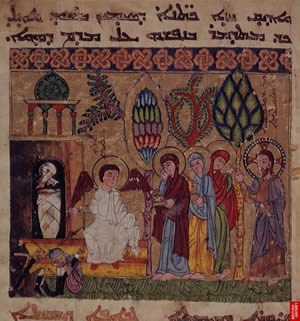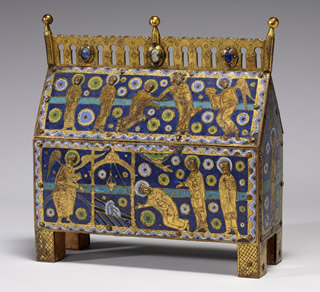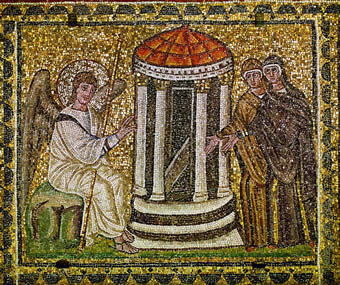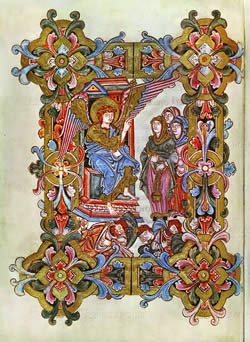From Our Archives
Debie Thomas, Slow Easter (2021); It Happens in the Dark (2018).
This Week's Essay
2 Timothy 1:10: "He destroyed death and brought life and immortality to light through the gospel."
For Sunday March 31, 2024
Easter Sunday
Lectionary Readings (Revised Common Lectionary, Year B)
Acts 10:34–43 or Isaiah 25:6–9
Psalm 118:1–2, 14–24
1 Corinthians 15:1–11 or Acts 10:34–43
John 20:1–18 or Mark 16:1–8
Last week my wife and I joined a dear friend in "sitting shiva" for her deceased father. Shiva is the seven-day Jewish period of mourning when friends and relatives gather to remember their loved one who has died. It's a formalized way to process grief and to offer comfort, through ritual, liturgy, Scripture, prayer, and story-telling. There were about sixty of us in the zoom room to share tears of laughter and sorrow.
Honoring the life and death of my friend's father reminded me of Ash Wednesday six weeks ago, when the priest imposed ashes on my forehead to symbolize my mortality. To each and every worshipper, one by one, she recited God's words to Adam in Genesis 3:19, “for dust you are, and to dust you will return.” These brutally honest words from three thousand years ago deconstruct the archetypal lie that Satan told Eve, and the cultural denial that flourishes today: "surely you will not die!"
Sitting shiva and observing Lent help me to live in reality. They remind me that my little life, and every single life, will end imperfect and unfinished. But then what? I dare say that every human being has asked that question.
 |
|
Syriac Gospel Lectionary, Northern Iraq, 1216–20. Holy Women at the Tomb.
|
You don't have to be religious to wonder about life after death. In his posthumous memoir called Mortality (2012), the zealous atheist Christopher Hitchens described in his final days of dying from esophageal cancer how he reflected on the poetry of TS Eliot: "I have seen the moment of my greatness flicker, / And I have seen the eternal Footman hold my coat, and snicker; / and I am afraid."
Sitting shiva also reminded me of my own parents. After my mother died in 2006, I stood alone in front of her casket at the Thomas Funeral Home in a small town in North Carolina. I twisted my neck so that my face would parallel hers. Hot tears streaked down my cheeks. My nose ran, my vision blurred. I touched mom's wrist, but it was cold and stiff.
Thanks to the mortician, she looked far better in death than she did in life—a spitting image of her own mother, our family agreed. That made me feel good, and I was grateful for the comfort.
But I also knew that her better-than-life appearance was a death-denying cultural contrivance designed to dull my pain and distract my attention from the harsh reality that my mom was dead. Gone. No more Saturday morning phone calls to ask her about Duke and Carolina basketball, no more annual visits for her May 20th birthday that coincided with Mother's Day, no more playing Scrabble in her tiny room.
 |
|
Reliquary Chasse with the Holy Women at the Tomb, copper gilt over wood, France, c. 1200.
|
My mother's grandfather was a Presbyterian pastor in small-town Ohio. Her own mother worshipped in that church for seventy-nine years. Mom later became the organist and choir director in her own church from 1967–1992.
So, every Sunday morning for eighty-three years my mom joined Christians across the last two thousand years and from around the world in confessing that Jesus "suffered under Pontius Pilate, was crucified, died, and was buried. On the third day he rose again from the dead… I believe in the resurrection of the body and in life everlasting." In other words, the end of life is not the End.
"This is what we preach, and this is what you believed," Paul wrote to the Corinthians in this week's epistle. That's what my mom believed, and that's what I believed that January afternoon beside her casket.
Things were different with my father. When he died in 1998, he donated his body to science for medical research. Eighteen months later, FedEx delivered his "cremains" to our house. I remember thinking that there had to be a better way to return such a sacred gift. I opened the box, untied the twisty that secured the plastic liner, and experienced what others had described to me. These were not nice, fluffy ashes, they were gritty shards of bone. I took a pinch of the coarse remains of my father and rubbed them between my thumb and fingers.
When I was in high school, my father stopped going to church. He never went back. I like to think that he lost his faith in the church as an institution but not his faith in the gospel. That was just my conjecture, my hope, until a few years ago when my sister sent me a newspaper clipping about Galion, Ohio, the little town where I was born.
 |
|
The two women and an angel at Christ's empty tomb (Luke 24:1-12). 6th century mosaic, Ravenna, Italy.
|
Galion was celebrating its 60th Anniversary Presentation of Handel's Messiah. Just two months after I was born, my father challenged the new choir director of the city schools to perform the Messiah. He responded, "if you get 75 people there for the first night of rehearsal, we'll do it." And that's what my father did. On that rainy November night in 1955, he kick-started a 60-year tradition. Their first performance of the Messiah in the high school auditorium featured a community choir of 129 members.
Today we think of Handel's Messiah as Christmas music, but it was written for Easter. Charles Jennens wrote the libretto based on the King James Bible, and Handel famously wrote the music in twenty-four-days from August 22 to September 14, 1741. The work is divided into three parts and follows the church's liturgical year, beginning with Isaiah's prophecies and ending with John's cosmic doxology in the book of Revelation.
I now believe that the music of the Messiah was my father's Easter faith.
For now is Christ risen from the dead, the first fruits of them that sleep.
Since by man came death, by man came also the resurrection of the dead. For as in Adam all die, even so in Christ shall all be made alive.
Behold, I tell you a mystery; we shall not all sleep, but we shall all be changed in a moment, in the twinkling of an eye, at the last trumpet.
The trumpet shall sound, and the dead shall be raised incorruptible, and we shall be changed. For this corruptible must put on incorruption and this mortal must put on immortality.
Then shall be brought to pass the saying that is written: "Death is swallowed up in victory."
O death, where is thy sting? O grave, where is thy victory?
But thanks be to God, who giveth us the victory through our Lord Jesus Christ.
Worthy is the Lamb that was slain, and hath redeemed us to God by His blood, to receive power, and riches, and wisdom, and strength, and honour, and glory, and blessing. Blessing and honour, glory and power, be unto Him that sitteth upon the throne, and unto the Lamb, for ever and ever. Amen.
The Scriptures portray "heaven" in many different ways. In Isaiah for this week, the Lord Almighty will “swallow up death forever.” Isaiah compares it to a feast with the finest aged wines that have been carefully filtered of all sediments, complimented with the best of meats. This is a global feast "for all peoples" and "all nations." At that time, God will "wipe away the tears from all faces."
Jesus promised "paradise" to the thief on the cross. Luke writes of "the restoration of all things." Paul called it the liberation of "all creation" from bondage to decay. In Revelation, John envisions a heavenly Jerusalem inhabited by citizens from "every nation, tribe, people, and language." In this Heavenly Jerusalem there's a Tree of Life for "the healing of the nations."
 |
|
Three women at the tomb, Anglo-Norman illuminated mss, 10th-12th century.
|
For now, though, Paul is very circumspect about our mortal lives. He writes of his "conflicts without and fears within." He says that we only see "through a glass darkly." We know "only in part." Our groanings are "too deep for words." We "don't know how to pray," he says. We don't understand our deepest desires (Romans 7:14ff).
But that doesn't mean we live in doom and gloom. Paul uses metaphors from farming and finance to clarify his ambivalence. In the midst of these sharp pangs of human mortality, God has given us a “deposit” that guarantees our future inheritance. A deposit is not a full payment, but it is a guarantee. We also experience the “first fruits” of a full harvest. The first fruits are limited, but they anticipate what is to come.
So, at present we live in hope of our future outcome. We experience what one theologian called the “is-ness of the shall be.” We pray to know a sure but limited sense of the Already of God’s coming kingdom, even though we know that it remains a future Not Yet.
As for the life to come, Paul is unrestrained. The outcome of Easter is beyond human imagination, says Paul. And that's how Mark Strand ends his haunting poem in the last stanza of The Last Seven Words:
Back down these stairs to the same scene,
to the moon, the stars, the night wind. Hours pass
and only the harp off in the distance and the wind
moving through it. And soon the sun’s gray disk,
darkened by clouds, sailing above. And beyond,
as always, the sea of endless transparence, of utmost
calm, a place of constant beginning that has within it
what no eye has seen, what no ear has heard, what no hand
has touched, what has not arisen in the human heart.
To that place, to the keeper of that place, I commit myself.
This Easter I follow in the faith of two billion people around the world — that nothing good will be lost. Nothing evil will remain. That is our Easter Hope, thanks be to God.
Weekly Prayer
George Herbert (1593–1633)
(a "shaped" or "patterned" poem)
Lord, Who createdst man in wealth and store,
Though foolishly he lost the same,
Decaying more and more,
Till he became
Most poore:
With Thee
O let me rise,
As larks, harmoniously,
And sing this day Thy victories:
Then shall the fall further the flight in me.
My tender age in sorrow did beginne;
And still with sicknesses and shame
Thou didst so punish sinne,
That I became
Most thinne.
With Thee
Let me combine,
And feel this day Thy victorie;
For, if I imp my wing on Thine,
Affliction shall advance the flight in me.
Dan Clendenin: dan@journeywithjesus.net
Image credits: (1) The British Library Online Gallery; (2) Treasure of Heaven, Columbia University; (3) Lessing Photo Archive; and (4) Lessing Photo Archive.





